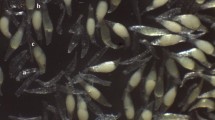Abstract
Opuntia spinosissima (Martyn) Mill. (Cactaceae) is an extremely rare taxon with a single remaining wild population of 13 plants located on Little Torch Key, Florida. The plants rarely set viable seeds and most ovaries abscise without initiation of fruits. Pollination and breeding system were examined in Little Torch Key and in plant accessions located at Fairchild Tropical Garden. Four pollination treatments were carried out to test for apomixis, self-pollination, outcrossing, and autogamy; a control treatment was also monitored. Additionally, pollen viability, pollinators, and seed set and viability were investigated. On selfed, crossed, and open (control) stigmas pollen grains germinated, but the tubes usually did not reach the base of the style. This suggests that O. spinosissima has pre-zygotic self-incompatibility. None of the pairwise crosses set seed, so the extant plants were apparently not inter-compatible. Out of 173 manipulated and control flowers, only one set fruit. Although this flower was outcrossed, no pollen tubes germinated on the stigma; this suggests agamospermy, a process common in the Cactaceae. In those flowers where pollen tubes did reach the ovary they failed to penetrate ovules, suggesting ovarian inhibition or that this taxon has lost the ability to be fertilized. Most field-collected seeds were viable, but there is no seedling recruitment under natural conditions, and vegetative reproduction is common. Based on these findings, I hypothesize that O. spinosissima is a sterile polyploid and that the 13 extant plants are asexually derived from a single lineage.
Similar content being viewed by others
Author information
Authors and Affiliations
Additional information
Received: 17 April 1998 / Revision accepted: 3 July 1998
Rights and permissions
About this article
Cite this article
Negrón-Ortiz, V. Reproductive biology of a rare cactus, Opuntia spinosissima (Cactaceae), in the Florida Keys: why is seed set very low?. Sex Plant Reprod 11, 208–212 (1998). https://doi.org/10.1007/s004970050143
Issue Date:
DOI: https://doi.org/10.1007/s004970050143




